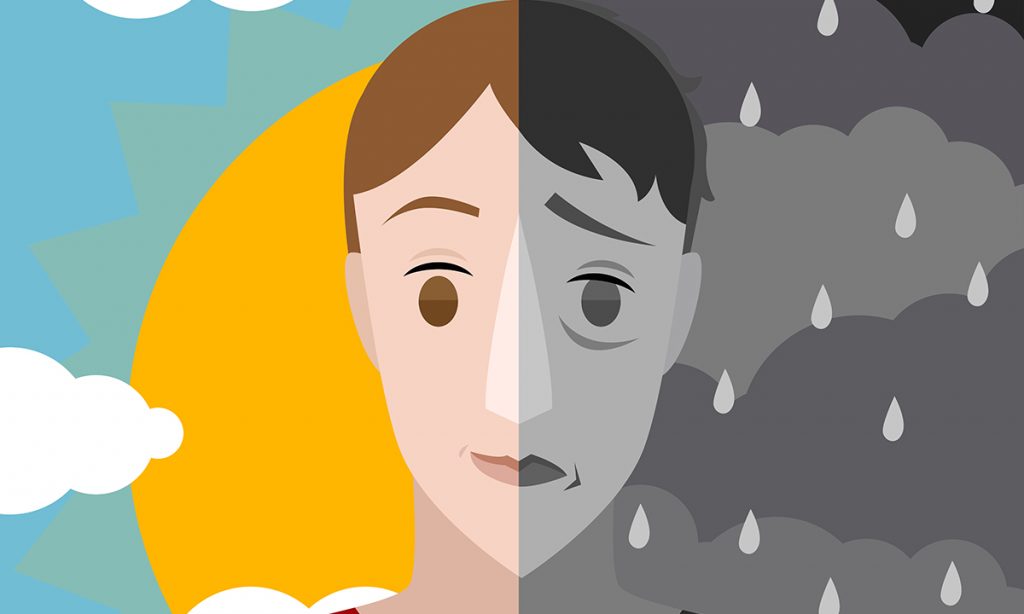
Introduction
Mood disorders are illnesses that have to do with the psychological and emotional state of an individual. There are a wide range of social and mental diseases that may be insidious and mystic, thereby allowing it to remain concealed. The several causes and triggers of mood disorders are comparative, ranging from genetic predisposition to life-threatening experiences, and it affects people of all age group.
Types of mood disorders
There are several types of mood disorders, caused by an individual’s inability to effectively coordinate his furthest happiness and sadness, within a socially acceptable range for a long time.
The two most common types of mood disorders are:
- Depression: This is a mood disorder characterized by a prolonged period of sadness, loss of interest, low spirit and emotional emptiness. The clinical signs of depression and the aftermath usually vary in person, but people who are depressed may constantly remain reserved and solemn. Triggers for depression may include; loss of a dear one, a traumatic experience, age, neglect, medication, genetic, social pressure, gender.
- Bipolar Disorder: This is a mood disorder characterized by intermittent sessions of depressive and maniac episodes, where the patient can experience periods of extreme elation, happiness and hyperactivity with or without immediate intervals of extreme sadness. Acquisition of this mood disorder can be due to genetic disorders, age, environmental factors.
When to suspect a mood disorder
Some mood disorders do not have a particular diagnostic symptom, and the manifestation is unique to each person, therefore, an individual can be diagnosed of a mood disorder while showing just a few changes that interfere with his daily activities, while another individual with the same mood disorder will show a wider range of symptoms.
Depression can be suspected when an individual begins to exhibit a lot of social changes, that can be observed from his appearance, facial expressions, outfits, and postures. They appear unexcited, uninterested, and will usually wear dull clothes. Depressed persons are predominantly sad, low-spirited and tearful.
On the other hand, bipolar disorder can be questioned when an individual is inexplicably highly energized, hyperactive and overexcited, with signs of excessive elation, pressure of speech, risky and disorganized actions during the maniac phases, followed by episodes of depression, exactly as seen in depressive disorder.
Possible consequences
Mood disorders can turn out to have a negative outcome on the patients. The worst consequences of mood disorder are suicidal tendencies and self harm, occurring mostly in the depressive states of the disorder. Other detrimental effects of mood disorders are sub optimal cognition, poor social interactions, low productivity at home and work places, inadequate social interaction, relationship and marriage failure, neglect, drug abuse etc.
The Remedy
Understanding the pathways involved in mood disorders is an important aspect medicine that have been overlooked for many years, therefore, the area is still beclouded with a lot of puzzles. In the management of mood disorders, the aim is to identify the predisposing and precipitating factors like genetics, medications or experiences, eliminating these factors, and then, engaging the patient in psychotherapy. Medications like mood stabilizers and anti-depressants can be employed by the psychiatrist depending on his clinical judgement of the case.
Summary
Just as in several emergency medical conditions, there is also a need for urgent medical and psychological interventions in persons with mood disorders. The quick availability of these interventions will go a long way in abating suicide in the general population, and also offsetting other aftermaths of mood disorders.
Onyeka, N. Victor
Clinical Medical Student,
Nnamdi Azikiwe University, Nigeria.
Onyeka, Nnaemeka Victor is a passionate content and copywriter. He is also a lover of poetry which have gotten him many publications.
Currently a clinical medical student, he has been privileged to get involved in so many philanthropic activities driven by passion to see a better world.
He simply loves writing, especially poetry and medical articles.


